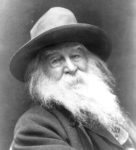
Photo by Prottoy Hassan
When I heard the learn’d astronomer,
When the proofs, the figures, were ranged in columns before me,
When I was shown the charts and diagrams, to add, divide, and measure them,
When I, sitting, heard the astronomer where he lectured with much applause in the lecture-room,
How soon unaccountable I became tired and sick,
Till rising and gliding out I wander’d off by myself,
In the mystical moist night-air, and from time to time,
Look’d up in perfect silence at the stars.





About Walt Whitman
Walt Whitman (1819 – 1892) was an American poet, essayist and journalist. He is considered among the most influential poets in the American canon, often called the father of free verse. Born on Long Island in New York State, he lived much of his life in Brooklyn. Whitman worked as a journalist, a teacher, and a government clerk. Whitman's major work, Leaves of Grass, was a poetry collection that he first published in 1855 with his own money. The work was an attempt at reaching out to the common person with an American epic, and he continued expanding and revising it until his death. During the American Civil War, he went to Washington, D.C. and worked in hospitals caring for the wounded. His poetry often focused on both loss and healing. After suffering a stroke in 1873, Whitman moved to Camden, New Jersey to be nearer to family. When he died at age 72, his funeral was a public event, and thousands lined the streets of Camden to watch his funeral procession. He left a strong legacy of work, and was claimed as the first “poet of democracy” in the United States.
Photo courtesy of Creative Commons.








